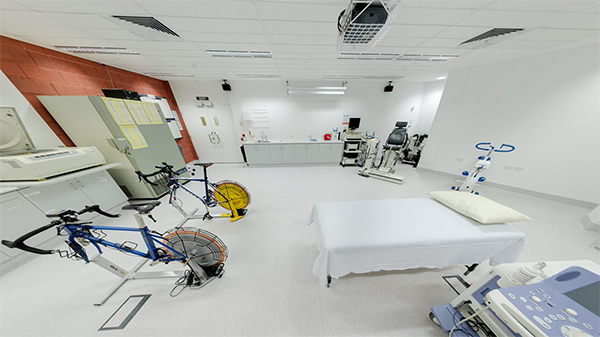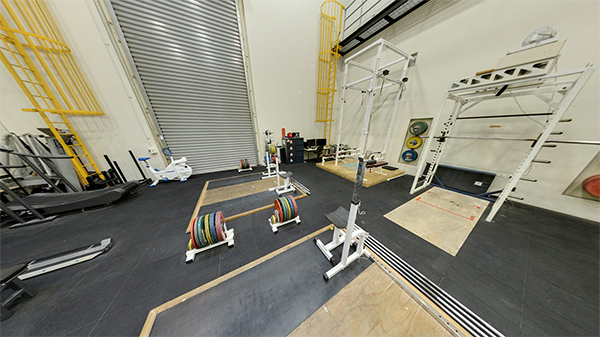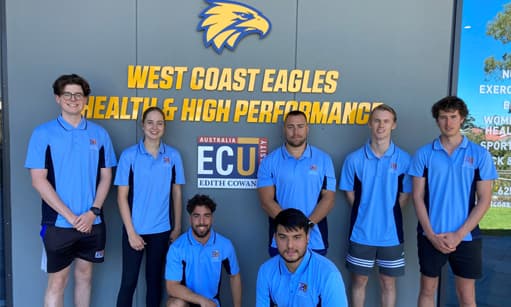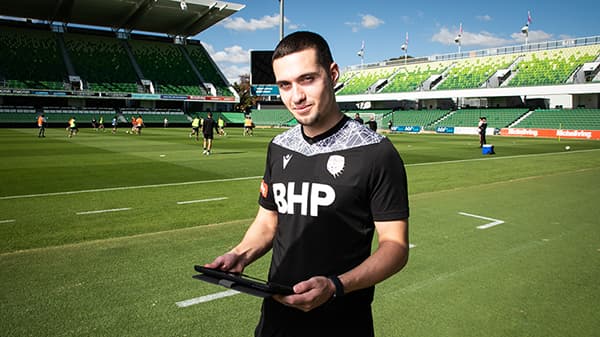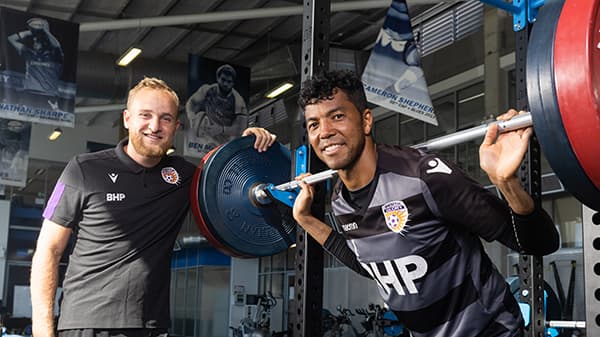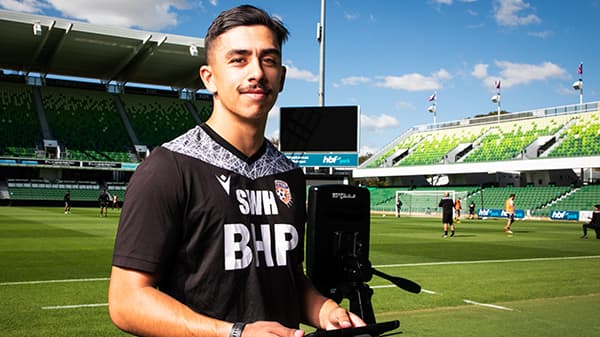Course code M89
Bachelor of Science (Exercise and Sports Science)
Creative thinkers made here.
Creative thinkers made here.

A unique study experience
A new agreement between ECU and the University of Portsmouth means you can study Exercise & Sports Science in Perth and the UK and graduate with a unique dual degree.
Read moreWhy study at ECU?
Toggle between study options for Domestic or International students
About this Course
Are you interested in health, fitness and general well-being? If you like the idea of helping other people improve their lifestyle or sports performance through exercise, you should explore a career in Exercise Science.
This degree will prepare you for a variety of professional roles – you could work with elite sportspeople, promote health in the community, work in corporate health or a wide range of other exciting environments The course will give you the skills to design, implement and evaluate programs targeted at improving general health and well-being, helping to prevent or reduce the impact of chronic disease and enhancing athletic performance.
You can also specialise in a related field, with majors in Football Performance, Health Promotion, Nutrition, Occupational Safety and Health and Sport Business helping broaden your career prospects. You can also use this course as a pathway to further study in areas such as clinical exercise physiology, education, dietetics and strength and conditioning coaching.
You can study units for this degree on-campus with weekly lectures and laboratories or through a blended format that involves weekly online content, such as lectures, laboratories, tutorials and/or seminars, accompanied by timetabled, intensive on-campus laboratory sessions twice per semester.
Australian Qualifications Framework (AQF) level
This course has been accredited by ECU as an AQF Level 7 Bachelor Degree Award.
Course code M89
Entry requirements
70 Indicative ATAR
ECU admission and English language requirements apply.
See Course Entry for further information.
Fees
Commonwealth supported - estimated 1st year indicative fee AUD $10,250
See Fees and Scholarships for further information.
Availability & Campus
| Location | Semester 1 | Semester 2 |
|---|---|---|
| Joondalup | FT PT | FT PT |
| Mount Lawley | ||
| South West | ||
| Online |
About this Course
Are you interested in health, fitness and general well-being? If you like the idea of helping other people improve their lifestyle or sports performance through exercise, you should explore a career in Exercise Science.
This degree will prepare you for a variety of professional roles – you could work with elite sportspeople, promote health in the community, work in corporate health or a wide range of other exciting environments The course will give you the skills to design, implement and evaluate programs targeted at improving general health and well-being, helping to prevent or reduce the impact of chronic disease and enhancing athletic performance.
You can also specialise in a related field, with majors in Football Performance, Health Promotion, Nutrition, Occupational Safety and Health and Sport Business helping broaden your career prospects. You can also use this course as a pathway to further study in areas such as clinical exercise physiology, education, dietetics and strength and conditioning coaching.
You can study units for this degree on-campus with weekly lectures and laboratories or through a blended format that involves weekly online content, such as lectures, laboratories, tutorials and/or seminars, accompanied by timetabled, intensive on-campus laboratory sessions twice per semester.
Australian Qualifications Framework (AQF) level
This course has been accredited by ECU as an AQF Level 7 Bachelor Degree Award.
Course code M89
CRICOS code 055462D
Entry requirements
ECU admission and English language requirements apply.
See Course Entry for further information.
Fees
International students - estimated 1st year indicative fee AUD $40,050
See Fees and Scholarships for further information.
Availability & Campus
| Location | Semester 1 | Semester 2 |
|---|---|---|
| Joondalup | FT | FT |
| Mount Lawley | ||
| South West | ||
| Online |
Course Entry
Admission requirements you'll need to meet for this course.
-
All applicants must meet the academic admission requirements for this course. The indicative or guaranteed ATAR is as published (where applicable) or academic admission requirements may be satisfied through completion of one of the following:
- AQF Cert IV;
- Successfully completed 0.25 EFTSL of study at bachelor level or higher at an Australian higher education provider (or equivalent);
- Undergraduate Certificate;
- Special Tertiary Admissions Test;*
- University Preparation Course;*
- Indigenous University Orientation Course;*
- Aboriginal University Readiness Assessment; or*
- Experience Based Entry Scheme.*
* Further information can be found on the Study course entry page.
For international students, requirements include your secondary school results.
-
English competency requirements may be satisfied through completion of one of the following:
- Year 12 English ATAR/English Literature ATAR grade C or better or equivalent;
- Special Tertiary Admissions Test;*
- IELTS Academic Overall band minimum score of 6.0 (no individual band less than 6.0);
- Successfully completed 1.0 EFTSL of study at bachelor level or higher in the UK, Ireland, USA, NZ or Canada;
- University Preparation Course;
- Indigenous University Orientation Course;*
- Aboriginal University Readiness Assessment;*
- AQF Diploma, Advanced Diploma or Associate Degree;
- Successfully completed 0.375 EFTSL of study at bachelor level or higher at an Australian higher education provider (or equivalent); or
- Other tests, courses or programs defined on the English Proficiency Bands page.
* Further information can be found on the Study course entry page.
Course Entry
Admission requirements you'll need to meet for this course.
-
All applicants must meet the academic admission requirements for this course. The indicative or guaranteed ATAR is as published (where applicable) or academic admission requirements may be satisfied through completion of one of the following:
- AQF Cert IV;
- Successfully completed 0.25 EFTSL of study at bachelor level or higher at an Australian higher education provider (or equivalent);
- Undergraduate Certificate;
- Special Tertiary Admissions Test;*
- University Preparation Course;*
- Indigenous University Orientation Course;*
- Aboriginal University Readiness Assessment; or*
- Experience Based Entry Scheme.*
* Further information can be found on the Study course entry page.
For international students, requirements include your secondary school results.
-
English competency requirements may be satisfied through completion of one of the following:
- Year 12 English ATAR/English Literature ATAR grade C or better or equivalent;
- Special Tertiary Admissions Test;*
- IELTS Academic Overall band minimum score of 6.0 (no individual band less than 6.0);
- Successfully completed 1.0 EFTSL of study at bachelor level or higher in the UK, Ireland, USA, NZ or Canada;
- University Preparation Course;
- Indigenous University Orientation Course;*
- Aboriginal University Readiness Assessment;*
- AQF Diploma, Advanced Diploma or Associate Degree;
- Successfully completed 0.375 EFTSL of study at bachelor level or higher at an Australian higher education provider (or equivalent); or
- Other tests, courses or programs defined on the English Proficiency Bands page.
* Further information can be found on the Study course entry page.
Course Details
Semester availability
Semester 1: Study full-time at Joondalup
Semester 1: Study part-time at Joondalup
Semester 2: Study full-time at Joondalup
Semester 2: Study part-time at Joondalup
Course Structure
Students are required to complete 24 Units consisting of 16 core units plus an 8- unit pathway, an 8- unit Major, a 6- unit minor plus 2 Recommended Electives or 8 Recommended Electives.
| Unit Code | Unit Title | Credit Points |
|---|---|---|
| MHS1101 | Anatomy and Physiology 1 | 15 |
| SPS1530 | Lifespan Growth and Development | 15 |
| NUT1121 | Human Nutrition | 15 |
| SPS1502 | Biomechanics | 15 |
| Unit Code | Unit Title | Credit Points |
|---|---|---|
| SPS1111 | Foundations of Fitness and Training | 15 |
| SPS1217 | Functional Anatomy | 15 |
| MHS1102 | Anatomy and Physiology 2 | 15 |
| MAT2107 | Statistical Research Methods | 15 |
| Unit Code | Unit Title | Credit Points |
|---|---|---|
| SPS2203 | Principles and Practices of Resistance Training | 15 |
| SPS2505 | Exercise Physiology | 15 |
| Unit from Major/Minor/Elective | 2 x units from Major, Minor or Recommended Elective | 30 |
| Unit Code | Unit Title | Credit Points |
|---|---|---|
| SPS2524 | Exercise Delivery | 15 |
| SPS2516 | Motor Learning and Control | 15 |
| SPS2622 | Psychology of Exercise and Health Behaviour | 15 |
| Unit from Major/Minor/Elective | 1 x unit from Major, Minor or Recommended Elective | 15 |
| Unit Code | Unit Title | Credit Points |
|---|---|---|
| SPS3105 | Advanced Resistance Training | 15 |
| SPS3112 | Exercise and Sports Science Practicum | 15 |
| Unit from Major/Minor/Elective | 2 x units from Major, Minor or Recommended Elective | 30 |
| Unit Code | Unit Title | Credit Points |
|---|---|---|
| SPS3111 | Physical Activity and Health | 15 |
| Unit from Major/Minor/Elective | 3 x units from Major, Minor or Recommended Elective | 45 |
| Unit Code | Unit Title | Credit Points |
|---|---|---|
| SPS3333 | Motor Behaviour | 15 |
| SPS3502 | Advanced Biomechanics | 15 |
| SPS3505 | Advanced Exercise Physiology | 15 |
| SPS1750 | Coaching Science 1 | 15 |
| SPS1755 | Coaching Science 2 | 15 |
| SPS2209 | Assessment of the Football Player | 15 |
| SPS2750 | Coaching Science 3 | 15 |
| SPS3755 | Coaching Science 5 | 15 |
| SPS1210 | Performance Analysis and Player Monitoring in Sport | 15 |
| SPS2615 | Sports Injury Prevention and Management | 15 |
| SPS3105 | Advanced Resistance Training | 15 |
| SPS3604 | Human Movement - Participation and Inclusion | 15 |
| SPS3114 | Conditioning for Team Sport Athletes | 15 |
| SPS3530 | Principles and Practices of Coaching | 15 |
| SPS2301 | Exercise Rehabilitation | 15 |
| HST1120 | Introduction to Health Promotion | 15 |
| SCP1134 | Foundations of Physics | 15 |
| SCH1104 | Introduction to Pathophysiology | 15 |
| SCH1105 | Introduction to Pharmacology | 15 |
| SPS3120 | Psycho-social Aspects in Physical Activity and Chronic Disease | 15 |
| SPS3121 | Professional Skills in Clinical Exercise Physiology | 15 |
| NUT3215 | Exercise Nutrition | 15 |
| SCC1226 | Introduction to Organic Chemistry and Biochemistry | 15 |
| NUT2211 | Metabolic Biochemistry | 15 |
| NUT2220 | Nutritional Assessment | 15 |
| SCH2232 | Medical Biochemistry | 15 |
| Select one unit from: | ||
| SCC1123 | Chemistry for the Life Sciences | 15 |
| SCC1111 | General Chemistry | 15 |
M89|13
For more detailed unit information for this course take a look at our Handbook. To organise your life for next semester visit the Teaching timetable.
Student handbookMajors you can study in this course
Course notes
Important course notes
-
Students are required to complete 2 mandatory practicum units: SPS3112 (140 hours), SPS2524 Exercise Delivery (30 hours).
Attendance requirements
Students will undertake the practicum placement during the hours laid down by their host organisation and students may be required to attend after hours and on the weekends.
Clearances and/or Risk Management Protocols Required
Prior to external placement, a risk management process must occur, including health and safety obligations, and a site visit (if practicable and reasonable). If an ongoing collaboration is approved by both parties, an official agreement contract is drafted between the University and the external agency.
A placement host may have vaccination and other requirements, including vaccination against Covid-19 unless you have a medical exemption. Please consider this requirement before enrolling in this Course, and speak with the Course Coordinator if this raises any concerns. You may not be able to complete placement units if you are unable to meet the placement requirements, which may impact your ability to complete this course.
Prior to placement, students must submit evidence of a Working with Children Check (where necessary) and a Cardio Pulmonary Resuscitation (CPR) First Aid Certificate.Professional practice rules
The practicum component of the course is attached to units SPS2524 and SPS3112 and successful completion of these core units, is a requirement for graduation. A pass grade for the practicum component is required to achieve a pass for the relevant core unit. Students who fail the practicum component are required to repeat the unit.
This could increase the duration of the course.
Course learning outcomes
- Apply broad discipline knowledge to a range of exercise and sport science theoretical and practical situations.
- Communicate exercise and sport science knowledge, concepts and skills to diverse population groups.
- Demonstrate a global outlook in exercise and sport science situations, showing sensitivity for diversity, including Aboriginal cultural competence.
- Demonstrate appropriate social and ethical values by working cooperatively and collaboratively in exercise and sports science settings.
- Demonstrate autonomy, accountability and initiative for own learning and professional practice.
- Think creatively to anticipate challenges and generate solutions in exercise and sport science contexts.
- Think critically to analyse, interpret and solve complex exercise and sport science situations.
- Use digital technologies and literacies to assess, evaluate and synthesise information from multiple sources.
Professional Recognition
CourseAccredited by: Exercise and Sports Science Australia (ESSA)
Graduating students will be eligible to apply for accreditation credentialing with ESSA. Please refer to ESSA website for further information regarding the application process. The course is Professionally-Accredited by Exercise and Sports Science Australia (ESSA), if completed in Australia. Please also note: ESSA English Language Requirements. All individuals seeking initial accreditation or returning to accreditation with ESSA must show English language competence (unless exempt).
Course Details
Semester availability
Semester 1: Study full-time at Joondalup
Semester 2: Study full-time at Joondalup
Course Structure
Students are required to complete 24 Units consisting of 16 core units plus an 8- unit pathway, an 8- unit Major, a 6- unit minor plus 2 Recommended Electives or 8 Recommended Electives.
| Unit Code | Unit Title | Credit Points |
|---|---|---|
| MHS1101 | Anatomy and Physiology 1 | 15 |
| SPS1530 | Lifespan Growth and Development | 15 |
| NUT1121 | Human Nutrition | 15 |
| SPS1502 | Biomechanics | 15 |
| Unit Code | Unit Title | Credit Points |
|---|---|---|
| SPS1111 | Foundations of Fitness and Training | 15 |
| SPS1217 | Functional Anatomy | 15 |
| MHS1102 | Anatomy and Physiology 2 | 15 |
| MAT2107 | Statistical Research Methods | 15 |
| Unit Code | Unit Title | Credit Points |
|---|---|---|
| SPS2203 | Principles and Practices of Resistance Training | 15 |
| SPS2505 | Exercise Physiology | 15 |
| Unit from Major/Minor/Elective | 2 x units from Major, Minor or Recommended Elective | 30 |
| Unit Code | Unit Title | Credit Points |
|---|---|---|
| SPS2524 | Exercise Delivery | 15 |
| SPS2516 | Motor Learning and Control | 15 |
| SPS2622 | Psychology of Exercise and Health Behaviour | 15 |
| Unit from Major/Minor/Elective | 1 x unit from Major, Minor or Recommended Elective | 15 |
| Unit Code | Unit Title | Credit Points |
|---|---|---|
| SPS3105 | Advanced Resistance Training | 15 |
| SPS3112 | Exercise and Sports Science Practicum | 15 |
| Unit from Major/Minor/Elective | 2 x units from Major, Minor or Recommended Elective | 30 |
| Unit Code | Unit Title | Credit Points |
|---|---|---|
| SPS3111 | Physical Activity and Health | 15 |
| Unit from Major/Minor/Elective | 3 x units from Major, Minor or Recommended Elective | 45 |
| Unit Code | Unit Title | Credit Points |
|---|---|---|
| SPS3333 | Motor Behaviour | 15 |
| SPS3502 | Advanced Biomechanics | 15 |
| SPS3505 | Advanced Exercise Physiology | 15 |
| SPS1750 | Coaching Science 1 | 15 |
| SPS1755 | Coaching Science 2 | 15 |
| SPS2209 | Assessment of the Football Player | 15 |
| SPS2750 | Coaching Science 3 | 15 |
| SPS3755 | Coaching Science 5 | 15 |
| SPS1210 | Performance Analysis and Player Monitoring in Sport | 15 |
| SPS2615 | Sports Injury Prevention and Management | 15 |
| SPS3105 | Advanced Resistance Training | 15 |
| SPS3604 | Human Movement - Participation and Inclusion | 15 |
| SPS3114 | Conditioning for Team Sport Athletes | 15 |
| SPS3530 | Principles and Practices of Coaching | 15 |
| SPS2301 | Exercise Rehabilitation | 15 |
| HST1120 | Introduction to Health Promotion | 15 |
| SCP1134 | Foundations of Physics | 15 |
| SCH1104 | Introduction to Pathophysiology | 15 |
| SCH1105 | Introduction to Pharmacology | 15 |
| SPS3120 | Psycho-social Aspects in Physical Activity and Chronic Disease | 15 |
| SPS3121 | Professional Skills in Clinical Exercise Physiology | 15 |
| NUT3215 | Exercise Nutrition | 15 |
| SCC1226 | Introduction to Organic Chemistry and Biochemistry | 15 |
| NUT2211 | Metabolic Biochemistry | 15 |
| NUT2220 | Nutritional Assessment | 15 |
| SCH2232 | Medical Biochemistry | 15 |
| Select one unit from: | ||
| SCC1123 | Chemistry for the Life Sciences | 15 |
| SCC1111 | General Chemistry | 15 |
M89|13
For more detailed unit information for this course take a look at our Handbook. To organise your life for next semester visit the Teaching timetable.
Student handbookMajors you can study in this course
Course notes
Important course notes
-
Students are required to complete 2 mandatory practicum units: SPS3112 (140 hours), SPS2524 Exercise Delivery (30 hours).
Attendance requirements
Students will undertake the practicum placement during the hours laid down by their host organisation and students may be required to attend after hours and on the weekends.
Clearances and/or Risk Management Protocols Required
Prior to external placement, a risk management process must occur, including health and safety obligations, and a site visit (if practicable and reasonable). If an ongoing collaboration is approved by both parties, an official agreement contract is drafted between the University and the external agency.
A placement host may have vaccination and other requirements, including vaccination against Covid-19 unless you have a medical exemption. Please consider this requirement before enrolling in this Course, and speak with the Course Coordinator if this raises any concerns. You may not be able to complete placement units if you are unable to meet the placement requirements, which may impact your ability to complete this course.
Prior to placement, students must submit evidence of a Working with Children Check (where necessary) and a Cardio Pulmonary Resuscitation (CPR) First Aid Certificate.Professional practice rules
The practicum component of the course is attached to units SPS2524 and SPS3112 and successful completion of these core units, is a requirement for graduation. A pass grade for the practicum component is required to achieve a pass for the relevant core unit. Students who fail the practicum component are required to repeat the unit.
This could increase the duration of the course.
Course learning outcomes
- Apply broad discipline knowledge to a range of exercise and sport science theoretical and practical situations.
- Communicate exercise and sport science knowledge, concepts and skills to diverse population groups.
- Demonstrate a global outlook in exercise and sport science situations, showing sensitivity for diversity, including Aboriginal cultural competence.
- Demonstrate appropriate social and ethical values by working cooperatively and collaboratively in exercise and sports science settings.
- Demonstrate autonomy, accountability and initiative for own learning and professional practice.
- Think creatively to anticipate challenges and generate solutions in exercise and sport science contexts.
- Think critically to analyse, interpret and solve complex exercise and sport science situations.
- Use digital technologies and literacies to assess, evaluate and synthesise information from multiple sources.
Professional Recognition
CourseAccredited by: Exercise and Sports Science Australia (ESSA)
Graduating students will be eligible to apply for accreditation credentialing with ESSA. Please refer to ESSA website for further information regarding the application process. The course is Professionally-Accredited by Exercise and Sports Science Australia (ESSA), if completed in Australia. Please also note: ESSA English Language Requirements. All individuals seeking initial accreditation or returning to accreditation with ESSA must show English language competence (unless exempt).
Fees and Scholarships
Fees
- AUD $10,250 - Commonwealth supported estimated 1st year indicative fee 1
Note
1 The 'estimated 1st year indicative fee' is provided as a guide only, based on a typical enrolment of students undertaking the first year of this course. At ECU, you pay for the individual units you enrol in, not an overall course fee, so the total cost of your course will vary, depending on what units you choose. An indicative fee will be provided with your course offer, however you can use our Course Fee Calculator to estimate the actual amount you'll need to pay. ECU fees are adjusted annually.
Some units require the payment of a fee for incidental goods or services required to complete those units. For more information and the full list of incidental fees for courses and units, visit What are Incidental Fees.
Scholarships
ECU has a scholarship program that provides many opportunities each year to students undertaking studies here.
Find a scholarshipCareer Opportunities
Graduates have successful careers in specialty areas such as exercise rehabilitation, sports administration, teaching, sports coaching, exercise science, strength and conditioning, corporate fitness, workplace health, sports development and sports performance analysis.
Possible future job titles
Exercise Scientist, Exercise Physiologist, Biomechanist, Personal Trainer, Sports Coach, Sports & Exercise Scientist, Researcher, Strength & Conditioning Coach, Sports Medicine Trainer, Exercise Rehabilitation Coach
Similar courses to consider
- Bachelor of Science (Exercise and Sports Science)/Bachelor of Commerce (Sport Business)
- Bachelor of Science (International Exercise and Sports Science)
- Graduate Certificate of Exercise Medicine (Oncology)
- Bachelor of Science (Exercise Science and Rehabilitation)
Students may be able to complete a fourth year of study in the Bachelor of Science (Exercise Science and Rehabilitation), upon completion of a recommended set of electives.
Courses you can consider if you are interested in progressing further in this area.
- Master of Teaching (Secondary)
- Master of Exercise Science (Strength and Conditioning)
- Master of Nutrition and Dietetics
Graduates of the Bachelor of Science (Exercise and Sports Science) may be able to enter into the Master of Nutrition and Dietetics upon completion of a recommended set of electives.
Fees and Scholarships
Fees
- AUD $40,050 - International students estimated 1st year indicative fee 1
Note
1 The 'estimated 1st year indicative fee' is provided as a guide only, and has been calculated based on a typical enrolment of students undertaking the first year of this course. At ECU, you pay for each individual unit you enrol in, not an overall course fee, so the total cost of your course will vary, depending on what units you choose. An indicative fee will be provided with your course offer, however you can use our Course Fee Calculator to estimate the actual amount you'll need to pay. ECU fees are adjusted annually.
Some units require the payment of a fee for incidental goods or services required to complete those units. For more information and the full list of incidental fees for courses and units, visit What are Incidental Fees.
Scholarships
ECU has a scholarship program that provides many opportunities each year to students undertaking studies here.
Find a scholarshipCareer Opportunities
Graduates have successful careers in specialty areas such as exercise rehabilitation, sports administration, teaching, sports coaching, exercise science, strength and conditioning, corporate fitness, workplace health, sports development and sports performance analysis.
Possible future job titles
Exercise Scientist, Exercise Physiologist, Biomechanist, Personal Trainer, Sports Coach, Sports & Exercise Scientist, Researcher, Strength & Conditioning Coach, Sports Medicine Trainer, Exercise Rehabilitation Coach
Similar courses to consider
- Bachelor of Science (Exercise and Sports Science)/Bachelor of Commerce (Sport Business)
- Bachelor of Science (International Exercise and Sports Science)
- Graduate Certificate of Exercise Medicine (Oncology)
- Bachelor of Science (Exercise Science and Rehabilitation)
Students may be able to complete a fourth year of study in the Bachelor of Science (Exercise Science and Rehabilitation), upon completion of a recommended set of electives.
Courses you can consider if you are interested in progressing further in this area.
- Master of Teaching (Secondary)
- Master of Exercise Science (Strength and Conditioning)
- Master of Nutrition and Dietetics
Graduates of the Bachelor of Science (Exercise and Sports Science) may be able to enter into the Master of Nutrition and Dietetics upon completion of a recommended set of electives.
Need some help deciding what to study?
Our future student events include a mix of on-campus and online sessions designed to help you decide what to study at ECU.
Creative thinkers start here
Facilities
View our facilities
Explore your options
Explore your options through the following media
Creative thinkers start here
Facilities
View our facilities
Explore your options
Explore your options through the following media
Student stories
Quick guide to uni-speak
-
-
The Australian Qualifications Framework (AQF) is the national regulator of qualifications in the Australian education and training system. The AQF defines the essential characteristics, including the required learning outcomes, of the different types of qualifications issued across the higher education systems in Australia.
-
ATAR is the Australian Tertiary Admission Rank, the primary criterion for entry into most undergraduate university courses in Australia. The ATAR is a percentile score which denotes a student's ranking relative to their state-wide peers upon completion of their secondary education.
-
CRICOS is the Commonwealth Register of Institutions and Courses for Overseas Students. A CRICOS code is allocated to education institutions (like ECU) who are approved to recruit, enrol and deliver education to overseas students. Courses with a CRICOS code are available to international students who meet the entry requirements.
-
A major, or unit set, is your chosen area of in-depth study in an undergraduate course. It usually involves 8 units of study, or one-third of the units in a 3-year degree. Talk to your Student Information Office if you need help choosing a major subject.
-
Minors include between 4 and 6 study units in a specific discipline. Not all courses require you to complete a minor. Your minor subject doesn't appear on your printed degree (parchment), but is part of your academic transcript.
-
If you're enrolled in 3 or more units in a semester this is considered full-time study. To complete most 3-year degrees studying full-time you'll need to complete 4 units per semester, i.e. 24 units over 3 years.
-
-
-
If a course is available to study part-time you can generally expect it to take twice as long to complete as it would in full-time mode. Part-time students are enrolled in 1 or 2 units maximum per semester.
Note: International students who hold a student visa can only choose the full-time study option for our courses. This is to ensure the course is completed within the duration of the student visa.
-
Most courses start in Semester 1 each year, usually in the last week of February. Some courses can be started in Semester 2 (we call this mid-year). There's a week of Orientation before each semester to help you get used to uni life.
-
A lot of our courses start in Semester 2 each year, usually in the last week of July. We call this mid-year. There's a week of Orientation beforehand to help you get used to uni life.
-
We use a points system to make it easier for you to understand your study progress. Most Bachelors degree study units are allocated 15 credit points. If you're studying a 3-year full-time degree you'll need to successfully complete 360 credit points - that's 24 units x 15 points per unit.
-
These are compulsory units you have to successfully complete as part of your course.
-
An elective is a unit you choose to study that counts towards your course requirements, but isn't compulsory. For some courses we recommend elective units. In some situations, a course coordinator may approve an elective unit as a replacement for a compulsory one.
-
Quick guide to uni-speak
-
-
The Australian Qualifications Framework (AQF) is the national regulator of qualifications in the Australian education and training system. The AQF defines the essential characteristics, including the required learning outcomes, of the different types of qualifications issued across the higher education systems in Australia.
-
ATAR is the Australian Tertiary Admission Rank, the primary criterion for entry into most undergraduate university courses in Australia. The ATAR is a percentile score which denotes a student's ranking relative to their state-wide peers upon completion of their secondary education.
-
CRICOS is the Commonwealth Register of Institutions and Courses for Overseas Students. A CRICOS code is allocated to education institutions (like ECU) who are approved to recruit, enrol and deliver education to overseas students. Courses with a CRICOS code are available to international students who meet the entry requirements.
-
A major, or unit set, is your chosen area of in-depth study in an undergraduate course. It usually involves 8 units of study, or one-third of the units in a 3-year degree. Talk to your Student Information Office if you need help choosing a major subject.
-
Minors include between 4 and 6 study units in a specific discipline. Not all courses require you to complete a minor. Your minor subject doesn't appear on your printed degree (parchment), but is part of your academic transcript.
-
If you're enrolled in 3 or more units in a semester this is considered full-time study. To complete most 3-year degrees studying full-time you'll need to complete 4 units per semester, i.e. 24 units over 3 years.
-
-
-
If a course is available to study part-time you can generally expect it to take twice as long to complete as it would in full-time mode. Part-time students are enrolled in 1 or 2 units maximum per semester.
Note: International students who hold a student visa can only choose the full-time study option for our courses. This is to ensure the course is completed within the duration of the student visa.
-
Most courses start in Semester 1 each year, usually in the last week of February. Some courses can be started in Semester 2 (we call this mid-year). There's a week of Orientation before each semester to help you get used to uni life.
-
A lot of our courses start in Semester 2 each year, usually in the last week of July. We call this mid-year. There's a week of Orientation beforehand to help you get used to uni life.
-
We use a points system to make it easier for you to understand your study progress. Most Bachelors degree study units are allocated 15 credit points. If you're studying a 3-year full-time degree you'll need to successfully complete 360 credit points - that's 24 units x 15 points per unit.
-
These are compulsory units you have to successfully complete as part of your course.
-
An elective is a unit you choose to study that counts towards your course requirements, but isn't compulsory. For some courses we recommend elective units. In some situations, a course coordinator may approve an elective unit as a replacement for a compulsory one.
-



